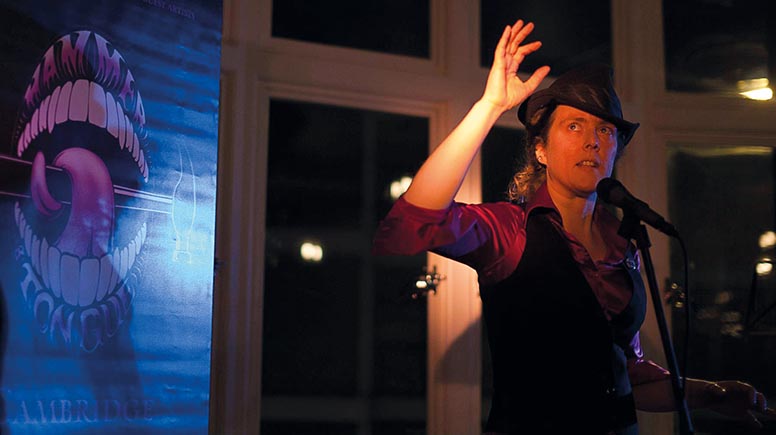In this month’s Cambridge Sound, Wesley Freeman-Smith meets the movers and shakers on the local performance poetry circuit, and recommends some not-to-be-missed gigs.
Across the country, the popularity of performance poetry is on the rise. No longer seen as niche, spoken word is becoming as mainstream as comedy or acoustic nights in many places, and here in Cambridge there’s a particularly strong scene. We have more than our fair share, in fact, and for anyone wishing to explore there are plenty of ways to dip your toes in. From the recently resurrected Verbal Remedies to established institutes such as CB1 Poetry, choices are plentiful.
Luckily, we’ve got two guides here more than happy to help you navigate. Committed converts and confessed poetry addicts Tim Knight and Uppahar ‘Ups’ Subba have thrown themselves in with abandon, and in exchange for coffee (which, in hindsight, was probably unwise) the pair wax lyrical about the Cambridge scene:
“Everyone’s so approachable… the only way I can describe it is ‘very welcoming’,” says Ups. “Once you’ve met one person they’ll introduce you to another, and so on… It’s like a lake – once the ripples hit the edges, more come back towards you.”
The first stop for many is Hammer & Tongue, which occupies the rock ’n’ roll end of the spoken word spectrum. Along with featured poets and headliners, the heart of the night is its open slam, a passionate battle of words between any poets brave enough to compete, rated by an audience with Olympic-style scorecards (it’s surprising how much people overthink the decimal points…) Each month’s winners go through to the Regional Final, and the winners of that go on to the National Final.
It’s feisty but not mean-spirited; rare is the occasion when anyone is thrown to the wolves. On the contrary, it’s designed to be fun – to lift poetry from dry pages, reinvigorated and invented anew for punters and performers alike. When run well, a slam can form a fundamental part of a poetry scene. It’s a forum to share your work in front of a live audience; invaluable to any performer seeking to up their game.
:: Hammer & Tongue’s next event is at Cambridge Junction, 3 April, 7.45pm (£7.50).
Until recently, the local branch of Hammer & Tongue lived at The Fountain – a venue more associated with club nights than poetry. By the time you read this, they’ll have relocated to Cambridge Junction; a place whose ‘Art Meets Life’ slogan could not be more fitting.
“I’m delighted we’ve been able to bring Hammer & Tongue into the arts centre. It’s even pushed our existing spoken word programming over the edge into deserving its own section on our website,” begins arts producer Daniel Pitt. “Across the country, the popularity and quality of spoken word and performance poetry has been growing, and Cambridge’s scene is going from strength to strength.”
Our guides, Tim and Ups, would agree. “Now people like Kate Tempest are doing tours and selling out wherever they’re playing, spoken word is more in the public eye. And to be starting out here at the shallow end of that is really exciting.”
A significant proportion of momentum locally comes from Fay Roberts – poet, host and organisational mastermind. In addition to running Cambridge’s H&T, Fay runs her own brand, Allographic Press. Allographic is cooperative rather than competitive, offering open mics free from scorecards and workshops for aspiring poets on all aspects of writing and performance. Its name is Greek for ‘other writing’, and in some way all Allographic happenings foster ‘other writings’, from supporting individuals in taking creative risks to providing space for voices often overshadowed in the arts.

For Hollie McNish, poetry is also about communication. Whether addressing attitudes towards breastfeeding or immigration, sexism or racism, she delivers her views in a no-nonsense fashion with both humour and empathy. How she writes is how she thinks. And it’s not just talk, either.
Locally and nationally Hollie provides workshops and performances promoting social inclusion and building confidence, often with young people. Earlier this year there was the Women of Influence project with Romsey Mill, and, before that, Walking With Women – uncovering and appreciating female figures whose voices had been lost to history. Since her videos Mathematics and Embarrassed went viral, Hollie’s work has been publicly proving that, despite its flowery reputation, poetry can provide the immediacy and wit art needs to incite change.
Perhaps one of the greatest strengths of performance poetry is accessibility; how it dispenses with the necessities of academic writing and offers a forum for all voices, whichever cultural strata they come from. One suspects, too, that Hollie’s popularity is part of the reason poets have been venturing out of the shadows in recent years.
:: Hollie McNish will be performing at Cambridge Junction on 5 May.
Another local poet on May’s bill is Charlotte Higgins. Possessing a melodic accent that could soothe a bear, Charlotte writes with a beguiling sensitivity – and whether it’s retelling fairytales or addressing social issues, her gaze is always unflinching and perceptive. The night she runs, Speakeasy, is based in the ADC Theatre Bar. It’s student-led, but open to everyone, showcasing feature poets and offering an open mic.
“The night is really welcoming and cosy… Really very cosy – the ADC Bar isn’t that big!”
A new music and poetry night has popped up at Anglia Ruskin University too, brilliantly named Two Stanzas Walk Into a Bar. It seems nice so far, and we’re hoping it continues to grow. A common theme throughout all the nights we’ve looked at here is their openness. If one thing’s for sure, poetry nights aren’t scary.
“You never feel out of place, or find yourself the odd one out,” Tim and Ups reassure us. “Everyone’s approachable. It’s like getting a nice hug.”

